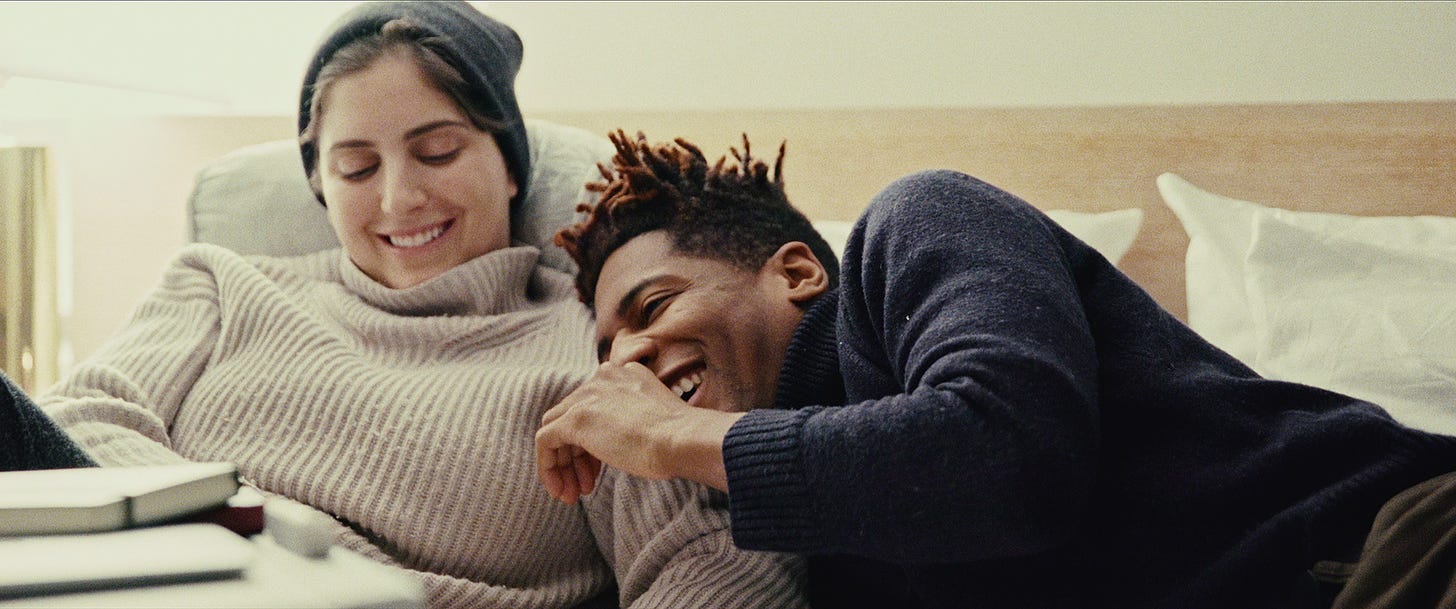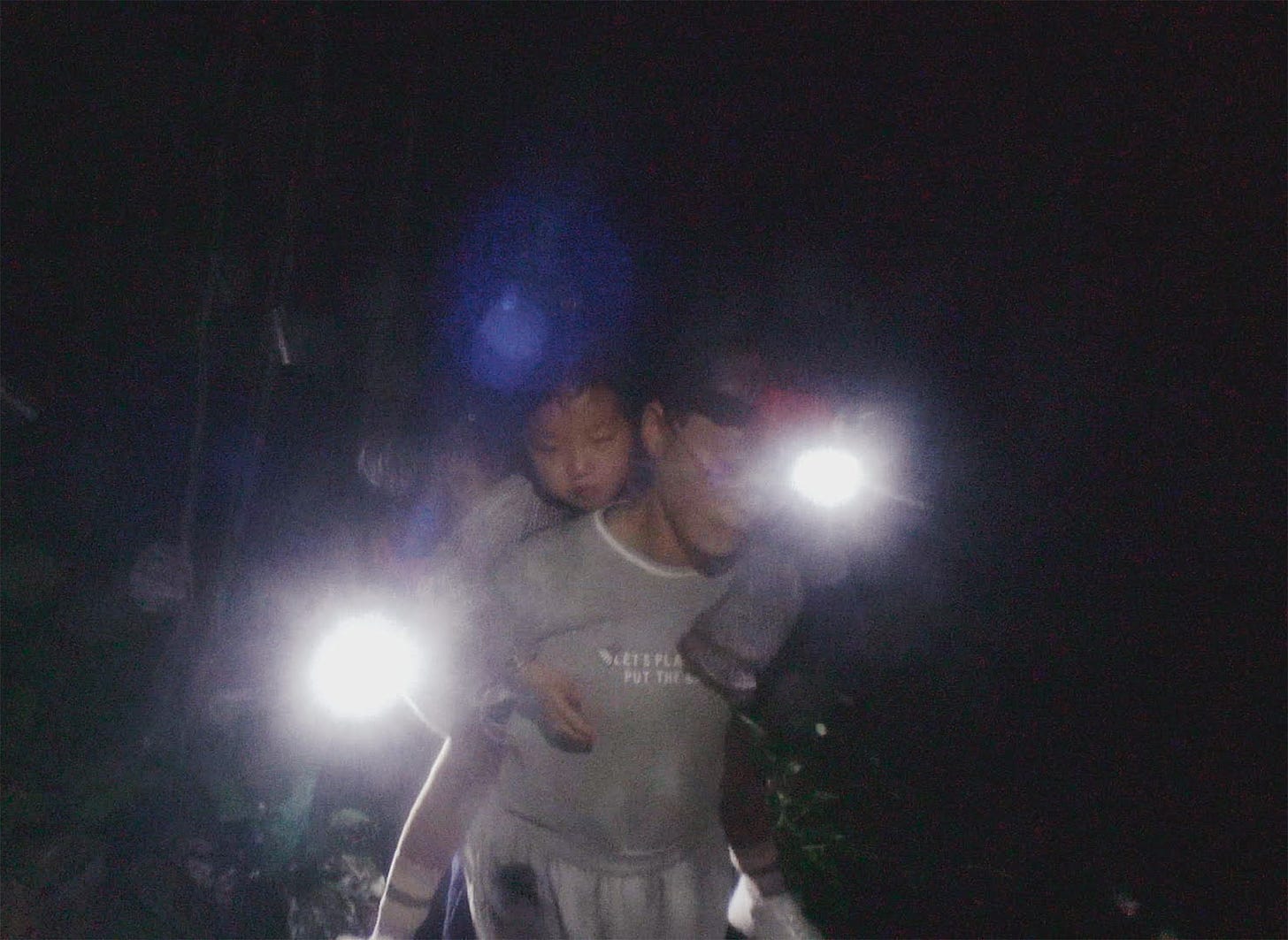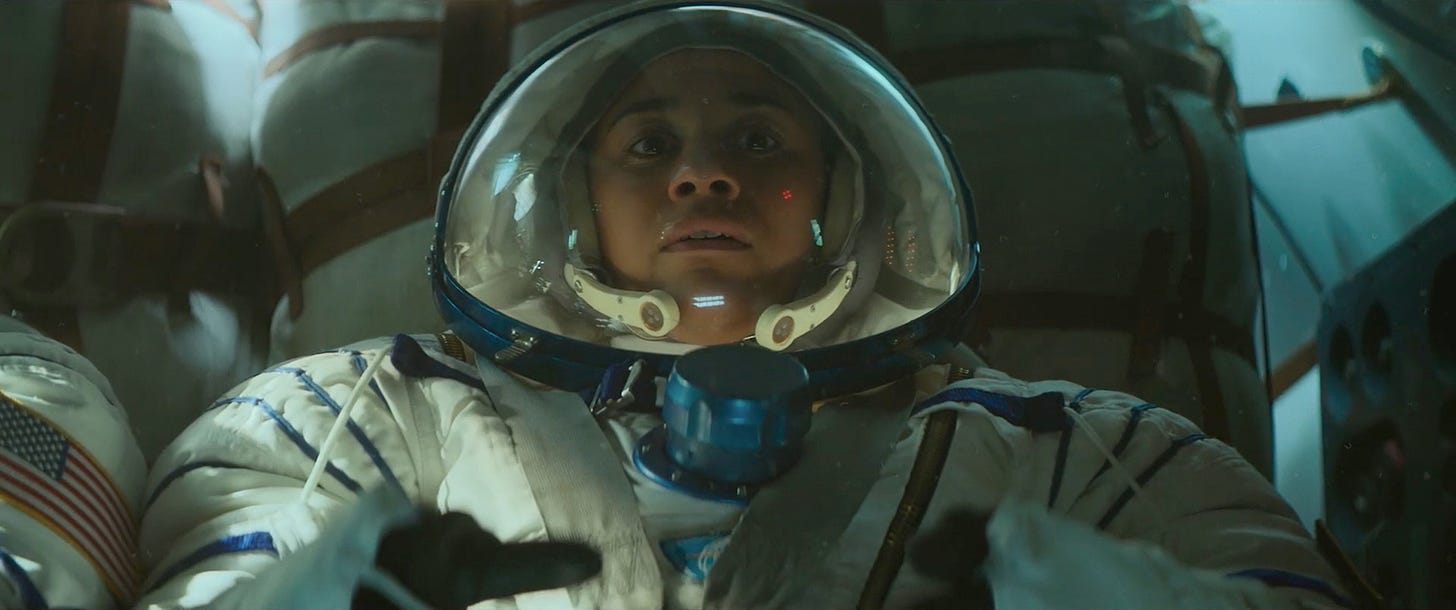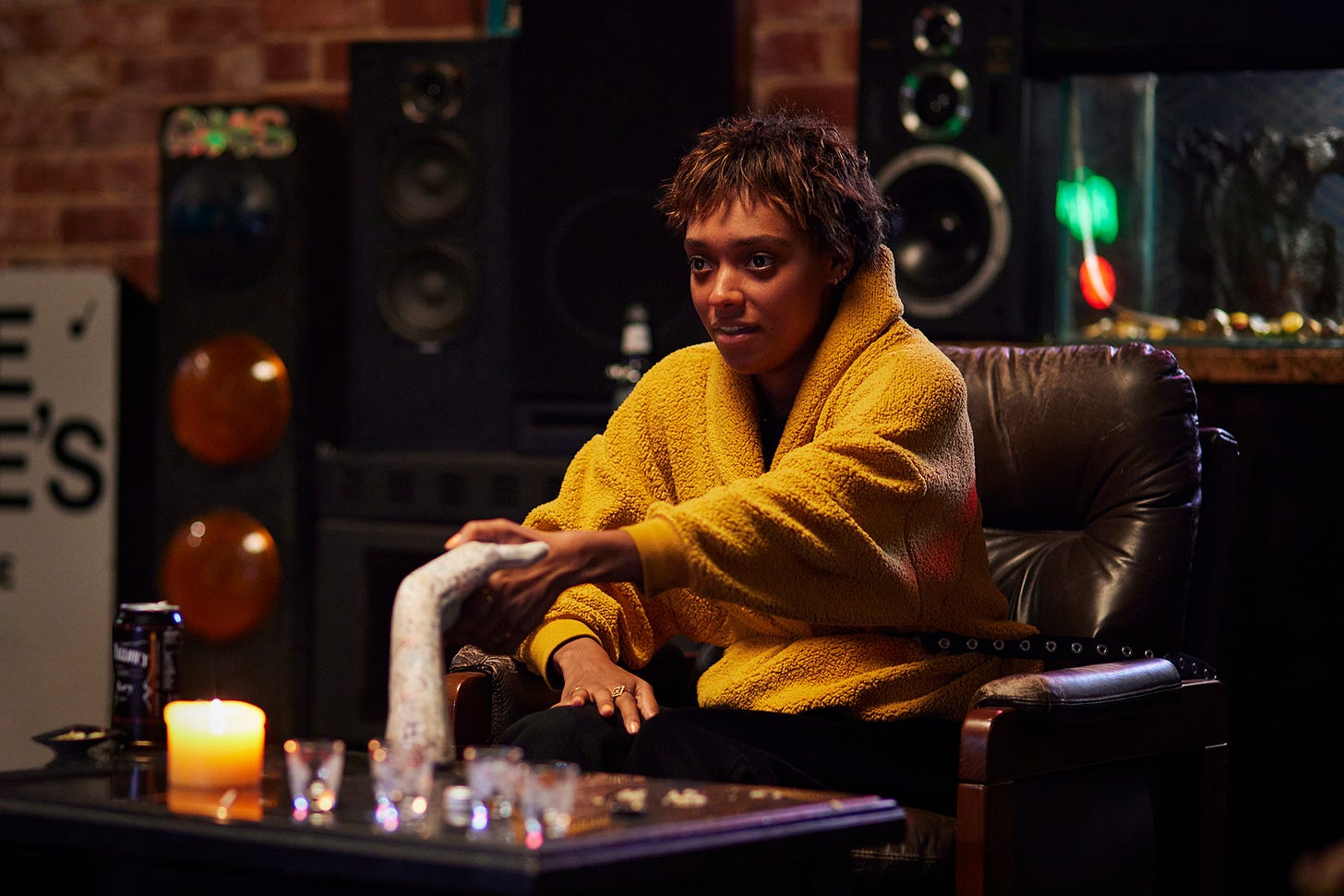The final OFCS ballot has been released.
I forgot how little time they give us between announcing the films and submitting our picks (only four days). Thankfully, the list pretty much consists of all the usual “safe” suspects. OPPENHEIMER got 12 nominations. KILLERS OF THE FLOWER MOON and POOR THINGS got 11 each. BARBIE got 9 and then there’s a steep-ish drop to ANATOMY OF A FALL and PAST LIVES with 5 each.
Of the 32 titles with at least one nod, I had already seen 28. So, after jamming three of the four that were missing into the past two days (reviews are below), I’m hopeful to get the last one watched tomorrow so I can 100% the ballot on Saturday. The two categories with those surprise picks that I had neglected thus far? Debut Feature (TALK TO ME) and Documentary (20 DAYS IN MARIUPOL, AMERICAN SYMPHONY, and BEYOND UTOPIA).
Those are the two awards with the most wiggle room as far as consensus goes. Debut features don’t always make it to the top of minds and conversations, so it’s easy to champion the ones you hold dear rather than be swayed. The same goes for documentaries since I’ve learned that many critics avoid them and thus have a limited spectrum with which to choose from. It’s why mainstream fare often does so well—see STILL: A MICHAEL J. FOX MOVIE winning the GWNYFCA and perhaps the OFCS too—having received the most eyeballs. Not everyone wants to engage with two hours of war and death unless they must.
What I Watched:
AMERICAN SYMPHONY
(streaming on Netflix)
Documentarian Matthew Heineman knows how to tell a story—effectively, emotionally, and … quickly. The guy has a new offering every year despite often being credited as cinematographer and editor on his own projects too. You almost want to tell him to slow down, except his output is too consistently good.
AMERICAN SYMPHONY is no exception. Begun as a way to put Jon Batiste’s process of getting the titular composition ready and practiced for a one-night only orchestral performance at Carnegie Hall, Heineman finds his subject on the edge of a massive precipice both in his professional and personal life. Fresh off an Oscar win for his work on SOUL, Batiste suddenly found himself as the most nominated artist at the 2022 Grammy Awards. His fame was skyrocketing just as his heart was breaking with the discovery that long-time partner (and now wife) Suleika Jaouad’s Leukemia had returned.
We get a little about his history at Juilliard and his performances on subways with a melodica. There’s his path into the lives of established artists who introduced him to each other en route to landing a gig as band leader on THE TONIGHT SHOW. The unbridled love for art, music, and life that never seems to fade even as the crippling anxiety hits. And then the present chaos of supporting Suleika, going on tour, preparing the symphony, and hoping the praise and exposure at the Grammys doesn’t push his ambition further than his health should allow.
I’m admittedly a Batiste fan. His song “Raindance” is one of my favorites of 2023 and seeing him working and existing with a genuine smile and passion to inspire is tough to dislike. That’s not the sole reason I enjoyed this film, though. As Batiste himself said during an acceptance speech: “Art is subjective.” However, I’m not sure anyone who understands what it is to create and love so deeply will be able to watch and not get something from the experience. It’s a wholesome, harrowing, and inspirational journey. And also the beginning of a new chapter marked by a cognizant potential for implosion. But it’s easy to believe he’ll be okay.
- 7/10
BEYOND UTOPIA
(on VOD/Digital HD)
The wildest revelation while watching Madeleine Gavin’s documentary BEYOND UTOPIA is that the North Koreans defecting on-screen aren’t doing so because they were deprogrammed. They simply understand that the severe punishments wrought upon those citizens with relations to prior defectors meant they weren’t going to be able to survive if they stayed. Ask the little girls trekking through the jungle in the dead of night about Kim Jong-Un and they are still quick to smile before declaring him the most important person in the world.
That’s how deep this indoctrination goes. When people talk about The Bible being forbidden at the start, I assumed they meant because it and Christianity are from the western world. So, I was shocked to learn the real reason was that Kim Il-Sung had plagiarized it so thoroughly in order to make himself into God and Kim Jong-Il into Jesus that he couldn’t afford the people questioning how the culture of many “American-Bastards” was so similar to their own. Everything about North Korean life is meticulously curated for absolute control.
This education courtesy of a handful of defectors speaking about their experiences was my favorite part of the film. Not because the harrowing escape by the Roh Family with help from South Korean Pastor Seungeun Kim or attempts by So-yeon Lee to pay for her seventeen-year-old son to join her in freedom aren’t affecting. They are. I just think the horrors of our world have numbed me to the point of seeing their struggles as familiar. There are too many oppressed people dealing with this situation and it’s become hard to stop myself from allowing the fatigue of believing it’s an unfixable problem to set in.
Learning more about the history and the experiences is thus a fresher and more engaging bit for my brain to latch onto. Rather than open myself up to caring for these unfortunate souls only to discover they won’t make it (the odds are less than a coin flip), I can absorb their trajectories with a similar objectivity—using their examples as a teaching tool rather than merely a means for an emotional reaction. Add some levity like a complete non sequitur about poop and it’s easy to stay invested intellectually just in case things don’t end up okay.
It’s therefore a tough movie to watch. But an important one to make certain you do. Because even if you too have come to the point of numbness for these crazy escapes (the Rohs must travel hundreds of miles through three or four countries without getting caught just to set foot on non-communist soil), the necessity of bearing witness never goes away. It’s one thing to approach innocent lives with hardened hearts so as not to continuously lose faith when they are inevitably lost. It’s another to willfully pretend that they don’t exist.
- 8/10
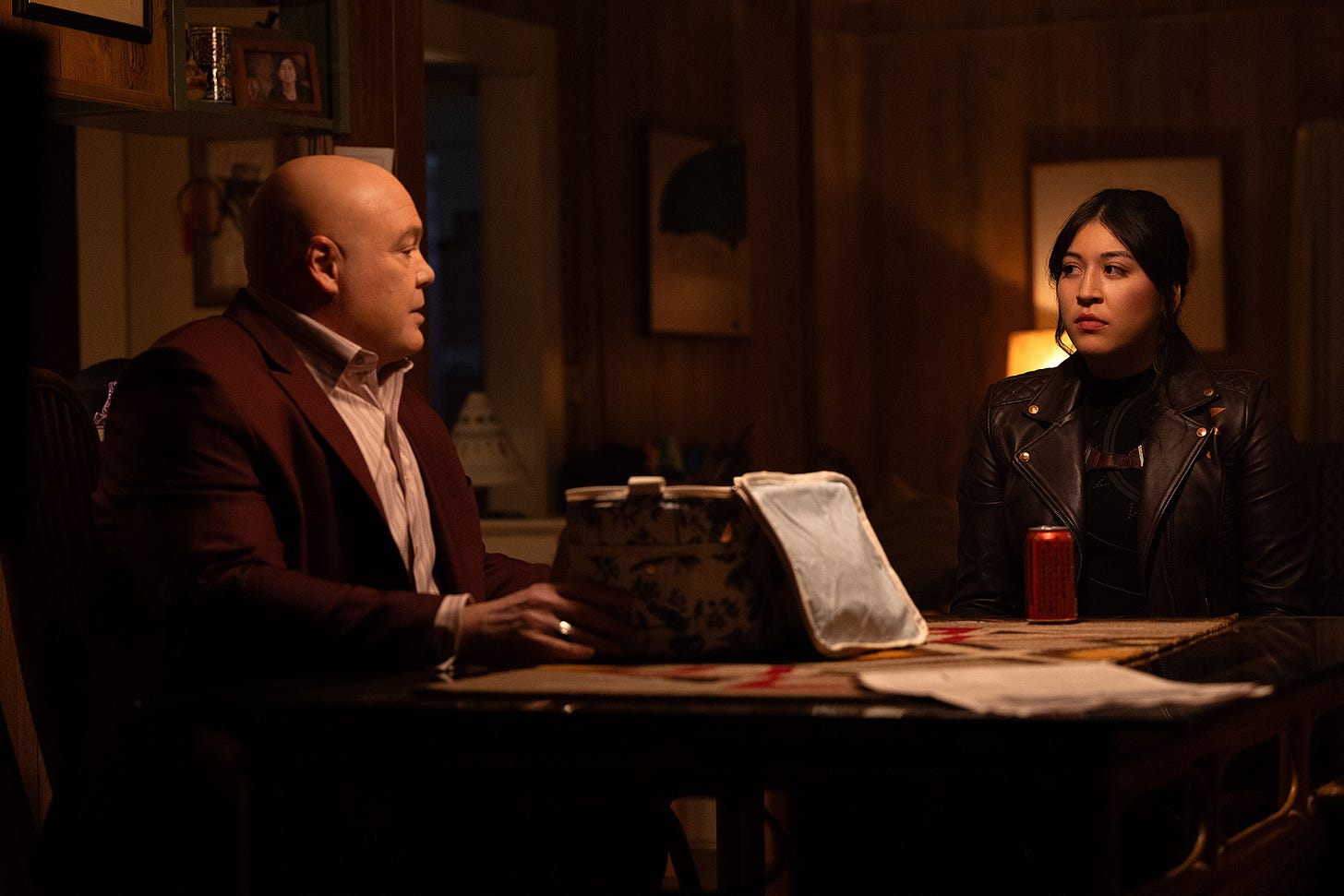
ECHO: Season 1
(streaming on Disney+)
While I haven’t read any definitive accounts of what happened during the production of Marvel’s ECHO, the size of the writing credits on each of the five episodes does seem to point to the creative re-structuring rumors have posited. Originally slated as eight episodes, the since debunked talk from Jeff Sneider was that Kevin Feige deemed the show “unreleasable” and looked to re-edit things down before deciding to practically reshoot the entire thing. Well, Disney apparently says they didn’t do that, but that’s exactly what they are doing with DAREDEVIL: REBORN. So, who really knows?
All we can do is judge the show that got released regardless of the mounting complications that seem to be plaguing Marvel lately. In my eyes, director Sydney Freeland and team delivered a dark and captivating story even if it may seem as much an example of wasted potential as it does a modest success. Yes, there’s blood and death to force Disney into putting a disclaimer at the front while creating an offshoot “Marvel Spotlight” brand that seems to separate it from the mainstream MCU despite the narrative being very much connected. But there’s also its dual-origin’s clunky trajectory populated by a ton of characters with nothing to do.
Case and point: Devery Jacobs. Cast as the cousin of star Alaqua Cox’s Maya Lopez, her Bonnie is pretty much a background pawn when not becoming a translator later on. We get a brief moment where the two begin to confront their struggles (Maya cut her and the rest of the family off after her father—Zahn McClarnon—was killed), but it’s pushed aside for present danger. So much of the interesting familial drama is treated that way. It would be okay if we finally got to it, but we don’t. The script washes the pain and suffering of these characters away with quick looks of blanket forgiveness so we can get to the next action sequence instead.
It’s why I wonder if ECHO would have been better served with those three extra episodes as long as the storytelling could sustain them. Now that every episode pretty much gets its own fight set-piece to revolve around, however, motivations and personality are trumped by violence. It leaves stalwarts Graham Greene and Tantoo Cardinal with little to do as Maya’s grandparents beyond reinforcing the central conflict that doesn’t need reinforcing. They blame Maya’s father for the death of their daughter and they let her grow-up under the care of Kingpin (Vincent D'Onofrio) as a result, turning her into a villain.
I do like the integration of Choctaw history (Maya is Blackfoot in the comics) and the flashbacks to ancestors who eventually imbue Maya with their abilities and strength. I think Cox does a great job carrying the whole too with Chaske Spencer providing her only real narrative complement considering he’s the only other person in Tamaha that knows who Kingpin is. Cody Lightning supplies some fun comic relief as Maya’s cousin Biscuits and D'Onofrio is as menacing as ever. So, while the process of building around its script’s major checkpoints feels unpolished and chaotic, those bones do ultimately prove effective.
In the end, Marvel once again proves it may have over-extended itself too far by putting too many projects onto a fast-track for representative content, setting them up to fail as a result due to thin support. That’s what happens when carefully laid plans become a billion-dollar machine: the desire to profit before the bubble bursts ends up being the catalyst for that very explosion.
- 6/10
I.S.S.
(in theaters)
It’s a solid premise. Especially now. Americans and Russians work in partnership on the International Space Station while tensions continue to rise on Earth between the two superpowers. You don’t have to be caught up on FOR ALL MANKIND to know that the scenario is ripe for implosion. So, when newcomer Dr. Kira Foster (Ariana DeBose) sees explosions outside the window, the initial fear about what’s happening back home is quickly replaced by anxiety for what’s about to happen in space.
Gabriela Cowperthwaite’s I.S.S. does well to give us some time with the six characters in Nick Shafir’s script to try and get a handle on who they are. Kira is our surrogate—a stranger learning with us. Gordon (Chris Messina) is the American commander with Nicholai (Costa Ronin) serving as his Russian counterpart—both genial and firm, but fair. Nika (Masha Mashkova) is the friendliest face of them all—helped by the fact she and Gordon are obviously a “thing”. Alexey (Pilou Asbæk) is the unfriendliest face—laconic and temperamental. And Christian (John Gallagher Jr.) is the wild card—kind, but with a dark undercurrent.
We therefore hatch our preconceptions about who will want to work together with the trust that has been built and who will put duty over experience once orders to take control of the space station “by any means necessary” come over the wire. Will a love affair be enough to ignore a directive? Will trust only end up exposing naïveté? How far will either side go to secure their own survival at the cost of their soul? Add an as yet unknown component of the research being done and those you don’t think capable of horrors might just catch you off-guard … and vice versa.
I say “might” because there isn’t anything on-screen that you haven’t seen before. If anything, Shafir and Cowperthwaite merely delay expectations rather than subvert them. And that’s fine. We’re here to be entertained and perhaps shaken awake by the very real possibility of nuclear war and the many ways one’s impact would be felt in the twenty-first century as opposed to the Cold War era. You’d like to think cooler heads would prevail between “enemies” that were friends just a second earlier, but fearmongering is a powerful political indoctrination tool.
The film honors its performances as far as never letting anyone fall so far out of character that you don’t believe what’s happening—a crucial necessity considering everything must stay grounded to maintain our investment in the stakes. So, while the beats are obvious and the tension often fabricated to the point of becoming inert, DeBose, Asbæk, and the others lend the action an honesty that elevates the material beyond simple A-to-B trajectories. It probably won’t leave too much of a lasting impression, but it serves its purpose as a ninety-minute diversion.
- 6/10
THE KITCHEN
(streaming on Netflix)
Born from a story about Londoners robbing a Westfield mall on mopeds that Kibwe Tavares heard at a barbershop, he and Daniel Kaluuya (who was starring in the former’s short film at the time) agreed to meet and flesh out a narrative behind the act itself. The result, THE KITCHEN (co-directed by the two and co-written by Kaluuya and Joe Murtagh), therefore proves a great example of how the creative process can evolve an idea. Because there is a scene where a gang on motorbikes smash and grab through a posh shopping centre, but it’s very short and occurs during the third act.
That’s what happens when you dig down and search for motive. Why would these people do this? Where do they come from? What do they hope to achieve? Suddenly this cool set-piece is leading them down avenues that head towards a dystopian future so much like our own present that you can’t help seeing the event as an act of rebellious disobedience—an “eye for an eye” act upon the wealthy by the poor in response to the intentionally constructed disparity that separates them. A world is born to house these characters as well as a story able to flesh out the scaffolding upon which it’s built.
Enter a near-future London where government housing has all been bought by private financiers to level, rebuild, and charge a fortune. And now it all comes down to “The Kitchen”—the last establishment yet to be razed because its inhabitants have refused to leave. The water has been shutoff. Deliveries have been blocked. Raids to disappear any “squatters” left in the open roll through to slowly whittle away the population’s resolve and physical presence itself. But they continue to stand tall. Sounds eerily similar to the apartheid state of Palestine at the hands of Israel to me, but also the oppressive police states gradually forming throughout Europe and the US too.
Rather than focus on just that environment, however, the filmmakers push in on one man caught within: Izi (Kane ‘Kano’ Robinson). Sick of the squalor and ready to escape (a few more paychecks and he’ll have his deposit for posh, albeit over-priced and tiny, new digs), he’s biding his time and locking his door. But looking out for #1 gets a little more difficult when he discovers the death of a woman he once knew and, in turn, meets the son she leaves behind (Jedaiah Bannerman’s Benji). Is he his son too? Does it matter if he has the means to look after a boy with nowhere else to go? Would being his father make Izi less likely to help rather than more?
That’s the human element that takes the spotlight. Can Izi be the family unit Benji is so desperately in need of finding or will he selfishly let the kid down in pursuit of the hollow dream the state has forced him to covet above compassion for his fellow man? A war is brewing and the line that must be crossed to survive isn’t as clear-cut as some might want to believe in order to extricate themselves from needing to get their hands dirty within the fight. And while that all may seem ripe for some intense action a la ATHENA, know that THE KITCHEN never quite rises to those pulse-pounding heights. Its incendiary politics remain backdrop.
The result is slow moving and perhaps a bit repetitive insofar as how hard it will prove for Izi to break free of his “me first” mentality, but there’s a lot to like too from performances to soundtrack to production design mixing LED and neon with digital interfaces and drones. It’s an ambitious project for a feature debut (for Kaluuya and Tavares both), but one they keep grounded to its human element to maintain an authenticity that doesn’t rely solely upon seamless CGI. And with a resonant and timely setting, there’s a lot to grab onto thematically as well to enjoy a solid and emotional, if somewhat safe, bit of socially conscious sci-fi.
- 6/10

NYAD
(streaming Netflix)
I’m not sure there could be a more perfect project for Jimmy Chin and Elizabeth Chai Vasarhelyi to pivot from documentary to fiction filmmakers than NYAD. Adapted by Julia Cox from Diana Nyad’s book Find a Way, the story has everything we’ve come to know of the duo’s work on MERU, FREE SOLO, and THE RESCUE. A captivating (and perhaps a bit polarizing) subject engaged in a death-defying feat. A “man vs. nature” conceit that’s less about conquering and more about living. And an inspirational backbone to balance suspense and heroics for an entertaining ride into the unknown.
There’s also the honest reality that things don’t always go your way. Maybe you’ll need a few attempts to climb that mountain or thirty-five years to swim that gulf. The main message is thus less about the success and more about the doing: Never give up. Because actions have only “never been done before” until someone finally does them. Just because Nyad’s dream to free swim from Cuba to Florida didn’t come to fruition at twenty-eight-years-old and that she stopped swimming for thirty years afterwards has no bearing on her drive to pick it right back up when the itch to go again arrives at age sixty.
What’s great about the film too, besides the true story itself and the teamwork and logistics necessary to try and pull this swim off, is that it’s a “warts and all” account. Diana Nyad (Annette Bening) is by all appearances on-screen a difficult person to be around. Justified or not, her ego gets her in a lot of trouble both by patronizing her friends and frustrating strangers. That stuff could have been sanitized. They could have made this on-screen version of Nyad just as strong and fiery as she is without focusing on just how much she proved her own worst enemy when it came to crossing the finish line. But that’s exactly the point.
She never would have without best friend and coach Bonnie Stoll (Jodie Foster) knowing which buttons to press. Nor without the late John Bartlett (Rhys Ifans) as navigator through insane currents threatening to take her off-course. Add cool new technology to keep sharks away and protect her body from jelly fish stings and it’s wild to think that all these collaborators donated their time since most sponsors wanted nothing to do with the potential notoriety of bankrolling a legend’s death. Cox’s ability to give these characters three dimensions and purpose without having to also steal focus from the star is an impressive juggling act.
And Chin and Vasarhelyi’s decision to inject a bit of documentary into the mix by constantly cutting to archival footage of the real Nyad’s swims and publicity tours lends a wonderful authenticity to the whole. I don’t know why so many filmmakers these days use computers to project the actor’s face onto the real person in such ancillary materials, but audiences aren’t so far gone that they cannot make the connection otherwise. Add a great soundtrack and awards-worthy turns from Bening and Foster and you get a feel-good crowd-pleaser that hits all the right notes to educate, inspire, and entertain.
- 7/10
TALK TO ME
(on VOD/Digital HD)
I love a horror film that understands its concept can be enough. We don’t need to know where the supposedly ceramic-dipped embalmed hand came from or why it works beyond a quick passage of dialogue positing that the rumors say it was once the hand of a psychic medium who spoke to the dead. That’s enough to make what it does make sense. Enough to let the nightmarish potential of playing with such an object unfold as unapologetically brutal as possible.
That’s exactly what directors Danny Philippou (who co-wrote with Bill Hinzman from a concept by Daley Pearson) and Michael Philippou do with TALK TO ME. They create a troubled and haunted character in Sophie Wilde’s Mia to be a wild card of a bridge who’s so desperate to want to speak to the dead that she’ll risk throwing out the rules to do so. Enter her facilitators (Zoe Terakes’ Hayley and Chris Alosio’s Joss) and her victims (Alexandra Jensen’s Jade and Joe Bird’s Riley) to push her to the brink of sanity once evil is in her ear.
The special effects and make-up is fantastic as every “spirit” who finds the candlelight to sit down and wait for a curious teenager to “let them in” and possess their body is memorably grotesque. The camerawork is kinetic. The dreams are intense. And the ability to wield hope as a weapon against salvation rather than for it is perfectly woven throughout the script. Because Mia hopes her mother didn’t commit suicide two years ago. She hopes whatever door they opened to the afterlife can be closed. She hopes no one else must die. But that belief can also kill.
Couple that nihilistic slant wherein faith becomes a tool for evil to undo good with a desire to let the characters’ actions dictate the plot rather than the other way around and you get an effective thriller that’s unafraid to embrace the darkness of its premise and the notion that happy endings aren’t happy for everyone. This is about sacrifice and reconciling what being “alone” means between the physical and emotional states of existence. It’s about understanding that the truth will never hurt more than the pain wrought by a stubborn desire to hold onto lies instead.
- 8/10
WHEN EVIL LURKS [Cuando acecha la maldad]
(streaming on Shudder)
Startled by gunshots, brothers Pedro (Ezequiel Rodríguez) and Jimi (Demián Salomón) cautiously leave their home to find out what’s happening. That they aren’t necessarily rattled after coming upon a dismembered body and a case of unfamiliar instruments is one thing, but their reaction upon seeing their rotting neighbor is another. This is a world where God is literally dead and churches cease to exist. Writer/director Demián Rugna has created a parallel universe where demons aren’t just stories to scare children. They are real. They are evil. And there’s no escaping them.
WHEN EVIL LURKS introduces its malevolent force as though it’s a disease. Pedro and Jimi want to leave, but Ruiz (Luis Ziembrowski) cajoles them into helping him move the rotting host instead. He believes its presence is a play on his land. That the police ignored a year-old report to let it wipe out the remote town and let whoever was pulling the strings take it for themselves. And why not think that way? If faith has been fully eradicated (despite some holding on tightly to crucifixes anyway), why wouldn’t capitalist greed replace it? Why pretend a human life is worth more than his possessions?
Rugna utilizes the usual demonic possession tropes, but in unique ways to ensure his mythology captivates on a purely visceral and aesthetic level. He doesn’t waste time explaining things—least of all the intricate devices used by “cleaners” to rid communities of “the rotten” before the evil within can be released. We have no choice but to take it all at face value because the stakes are so high. Yes, we want to pull for Pedro’s family to survive, but there’s also the looming danger that they’re all that stands in the way of apocalypse too. Save his children, save the world.
The result is very creepy and deceptively smart insofar as creating a universe to make the no-holds-barred blood and gore play in earnest. It’s the sort of severe tone that could easily fall into farce (I admittedly chuckled a couple times before the drama rebalanced), so kudos to Rugna for staying the course and never wavering as he puts his characters through an emotional wringer more so than a physically punishing one. Because while the deaths are gruesome, we only truly see them through the corner of Pedro’s eyes. It’s as though this ordeal is a personal punishment wherein everyone he loves must pay the price.
- 8/10
Cinematic F-Bombs:
This weekend sees BENNY & JOON (1993), THE RIGHT STUFF (1983), STAND AND DELIVER (1988), TERMS OF ENDEARMENT (1983), and TOOTSIE (1982) getting added to the archive (cinematicfbombs.com on Sunday, Twitter on Monday).

New Releases This Week:
(Review links where applicable)
Opening Buffalo-area theaters 1/19/24 -
ALL OF US STRANGERS at Dipson Amherst; Regal Quaker
“Haigh beautifully handles the narrative progressions to ensure he doesn't have to jump through hoops distracting us from a truth hidden in plain sight. He knows how to use his script to prevent us from asking questions, but it never feels manipulative.” – Full thoughts at HHYS.
CAPTAIN MILLER at Regal Elmwood
CULT KILLER at Regal Transit
DRIVING MADELEINE at Dipson Amherst
FOUNDERS DAY at Regal Elmwood, Transit, Galleria & Quaker
“What's fun about the film is that it proves to be [about justice and jealousies] at once. And rather than be a cop-out as a result, this reality enhances the whole.” – Full thoughts at HHYS.
FREUD'S LAST SESSION at North Park Theatre; Regal Transit, Galleria & Quaker
“Despite solid performances and an entertaining script built upon flashbacks that show Freud and Lewis's own flaws and hypocrisies, the film mostly just moves in circles.” – Full thoughts at HHYS.
I.S.S. at Dipson Flix & Capitol; AMC Maple Ridge; Regal Elmwood, Transit, Galleria & Quaker
Thoughts are above.
SAINDHAV at Regal Elmwood
Streaming from 1/19/24 -
60 MINUTES – Netflix on 1/19
CAGED WINGS [Mi Soledad Tiene Alas] – Netflix on 1/19
THE KITCHEN – Netflix on 1/19
Thoughts are above.
THE LAST REPAIR SHOP – Disney+ on 1/23
Now on VOD/Digital HD -
THE COLOR PURPLE (1/16)
“I really liked the final 25-30 minutes of the THE COLOR PURPLE. The first-two hours, though? A freight train of a Cliff's Notes cram session that seems to slap you in the face to look somewhere else whenever a dramatic moment implores you to take a pause.” – Full thoughts at HHYS.
THE MARVELS (1/16)
“Fans of MS. MARVEL (like me) should have a great time with this team-up because despite the heavier moments of Carol Danvers and Monica Rambeau reuniting after decades apart, the bigger focus is on Kamala Khan meeting her idol.” – Full thoughts at HHYS.
NEXT GOAL WINS (1/16)
“It's not going to win any awards, but it should do very well at the box office. Because despite there being zero surprises as it fulfills its mass-marketed for-profit formula, NEXT GOAL WINS never talks down to us.” – Full thoughts at The Film Stage.
ONE MORE SHOT (1/16)
THE SACRIFICE GAME (1/16)
SUNRISE (1/19)





